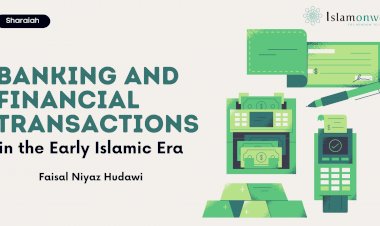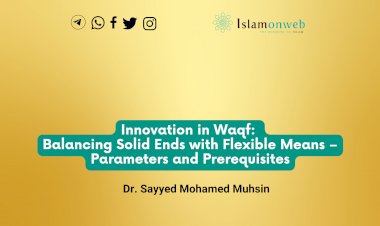Financial Transactions and Wealth Management in the Light of Higher Objectives of SharīʿAh
Part -1
INTRODUCTION
The wisdom of Almighty Allah intended human life to be on earth with a need for interpersonal relationships within their surroundings and cultures and beyond for earning their livelihood. In order to foster a culture of the utilization of the earth for cultivation, accumulation of wealth and digging out of valuable minerals, Allah granted for people the right of ownership. Likewise, people carry out transactions and exchange of properties; thereby, they benefit each other in their routines. The transaction sometimes takes place without compensation in lieu like gifts and presents, and at other times it is performed for compensation that refers to trade, including sale and leasing. Trade is the activity or process of buying, selling, or exchanging goods or services.
Governing the human conduct and social interaction with classic principles, the Sharīʿah not only allowed trading and doing business but also promoted the efforts thereof. As a result, a big number from the companions of Prophets involved in trades and strived to realize business success. Islam commands and encourages being the working people and considers the work as a high virtue. In addition, the scholars denounce the nature of sitting idle without any actions for growth and success and end up in begging by impairing the human honour and shattering one's personality.
Instead of sinking in committing bad innovations and plunging to the doom, any human being has to give weight to the rules and regulations set by the Sharīʿah for the trades to get rid of unlawful transactions and stay from usury-based businesses. The basic law for all transactions is legal, whereas prohibition is charged only if it goes against the Sharīʿah principles. Suppose the trade consists of forgery or deliberate creation of losses to others or any factor that leads to the disputes among people, thus to culminate in deceiving trade. In that case, the Sharīʿah forbids to be part of that trade. So, people need to be precautious to carry out the transactions only in Sharīʿah-compliant methods that are built on proper circulation, flourishing with one's properties and social benefits out of its growth and outcomes.
The higher objectives of Sharīʿah (maqāṣid al-Sharīʿah) are explained as the philosophy of Islamic law, its outlook and goals at large that cast light on ultimate secrets behind the various Islamic legal interpretations. The practical application of maqāṣid will enable society to make a significant difference with robust and efficient wealth management. Islam accentuated the achievement of four objectives in determining the transactions and exchanges of their properties; the objectives are as given below:
- Durability and Stability (thabāt).
- Marketability and Distribution of Wealth (rawāj).
- Transparency (wuḍūh).
- Justice and Equity (ʿadl).
DURABILITY AND STABILITY (THABĀT)
Durability and Stability are among the primary objectives in the financial transactions, which are obtained by Stability of wealth and property in the hands of owners by protecting their ownership thereby the owners do not fear of loss or its transfer to other without a valid contract or right. As part of giving weight to the Stability, Islam approved the validity of ownership of matters carried out in jahiliyyah. Regarding this approval, Abu al-Waleed al-Baji noted that approval of the contracts taken place in jahiliyyah meant to facilitate the continuation of sales and marriage contracts carried out in that period. However, they were invalid, thus to legalize their ownerships.
For the reason of durability and Stability, Islam posited the willingness and consent as the cornerstones of any valid contracts. Allah says: "O you who have believed, do not consume one another's wealth unjustly but only [in lawful] business by mutual consent" (al-Nisa: 29).
For the achievement of durability, Islam stipulated the fulfilment of contracts as a mandatory obligation. Allah says, "O you who have believed, fulfill [all] contracts." (al-Maidah: 1). This verse is deemed as the foundation of several legal rulings and inclusive of many issues. The contracts become binding by the wordings; if a person says "I sold" and other replies "I bought", the contract is valid and binding. Likewise, the contracting parties have the option to dissolve the contract before they disperse from the spot of the contract.
The Islamic law demands the parties to meet the conditions of the contract, as the Prophet (s.a.w.) said: "Muslim are with (i.e. are bound to fulfil) conditions". The above hadith emphasizes that the candidness and magnitude of faith of Muslim are evident in his fulfilment of conditions.
For the achievement of Stability, Islam gives freedom for the owners to use their possessions and prohibits ignorance, uncertainty.
MARKETABILITY AND DISTRIBUTION OF WEALTH (RAWĀJ)
One of the primary objectives in the wealth is its adequate circulation in the hands of people and its availability with easy access as far as possible. This objective is achieved by promotion of marketability and prohibition of hoarding or exclusive occupation over the wealth; rather healthy competitions in financial activities, thereby to flourishing the opportunities are welcomed.
The reason behind some of the prohibited transactions in Islam is its obstacles in the marketability, whereas Islam shows keen concern in removing the obstacles in fair financial initiatives and its circulation. Prophet (s.a.w.) denounces: "No one hoards but one who is in error", it is because the hoarder poses threats to whole society at large by ruining their routines as well as markets. The prohibition of hoarding is issued due to serious concern of the Sharīʿah for the public good.
For facilitating marketability, Islam promotes the trade and markets that make the products and services easily obtainable. The Quran uses the phrase "seeking of Allah's bounties" for doing business for "profit" and mentions trade together with fighting for Allah's cause with a message of its importance in the sight of the Sharīʿah: "and others who will go about the land in search of God's bounty, and others who will fight in God's cause" (al-Muzammil: 20).
Islam prohibits the 'exploitative commercial arbitrage' (Talaqqi al-Rukban) in which a city-dweller purchases goods from a Bedouin (desert-dweller) at a cheaper price before the latter gets into the market. It is an illegal practice because the public suffers from it because they are forced to buy the goods at high prices due to the above-mentioned illegal arbitrage. 'Abd Allah bin 'Umar said: "We were practising Talaqqi al-Rukban and we buy food from them, then the Prophet (s.a.w.) prohibited doing it until we reach to the food of market". Before the advent of Islam, the black market was quite common, but Islam prohibited it given it comprises monopolistic collusion, manipulative trade and exploitative acts.
Likewise, the Prophet (s.a.w.) prohibited the sale of city-dweller to Bedouin because the latter was largely exploited due to unawareness and ignorance about the market price. The famous jurist Yahya bin Umar (d. 289 AH) observed: "In my view, owner in the market should ask the Bedouins, when they come with food, not to conclude the sale in hotels and motels. They have to take them to markets of Muslims". Hoarding causes price-hike and inflicts harm on people.
The jurists are in consensus that if people are in trouble and one person hoards all food, then they can force the hoarder to sell his goods. The unavailability of stocks in the market will raise the demand of people; thus, the hoarder makes sales with a higher price, exploiting the needy situation of people.
Umar Ibn al-Khattab said: "Someone who brings imported goods suffering great fatigue to himself in the summer and winter, such a person is the guest of Umar. Let him sell what Allah wills and keep what Allah wills." This statement shows his appreciation for the efforts and hard work done by importers to make the goods reach to people who require it.
However, some compromises may happen in some rulings with non-citizens by reducing the fees and levies in order to remove the trade obstacles. Putting the properties stagnant without using or utilizing is also reprehensible; one of the objectives behind zakat is to propel the use of the property. Umar (r.a.) said: "Trade with the property of orphans and then it will not be eroded by zakat." Imam Malik said that our predecessors found the prevention of trade as defect and huge fraud. At the heart of fair marketability, the traders can enhance their opportunities and people can benefit with reasonable price.
(Dr. Qais bin Mohammed al-Mubarak,Professor of Islamic Jurisprudence, King Faisal University, Al-Ahsa)
Disclaimer
The views expressed in this article are the author’s own and do not necessarily mirror Islamonweb’s editorial stance.
























Leave A Comment